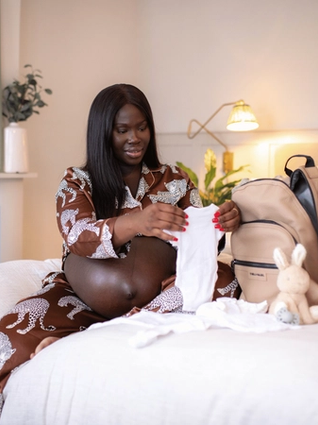
- Home
- Tools And Resources
- Packing Your Bag Ready For Birth
Packing your bag ready for birth
Use our hospital bag checklist to pack essentials for yourself, your baby, and your birth partner. Ensure you’re fully prepared for your hospital stay today.
Packing your bag ready for birth
Regardless of where you decide to give birth, you should pack a bag and set it aside in an easy to reach location in preparation for the big day. If you plan to give birth at home, have a bag ready in case there becomes a need to transfer in to hospital.
When to pack your hospital bag
You might want to start thinking about what you might need for birth during your third trimester and have it ready by around 36 weeks.
You might be wondering what to pack in your hospital bag and we generally suggest that you have a bag for yourself, baby and birth partner.
Hospital bag list for mum
- Pyjamas or (front opening) nightdress
- Dressing gown
- Slippers
- Warm socks
- Toilet bag and toiletries: toothpaste, toothbrush, hairbrush, deodorant, hair ties, body lotion, body wash and anything else you might need
- Bath towel
- Nursing or Maternity bras
- Face wipes
- Lip balm
- Camera/video with spare batteries
- Your birth plan
- An old nightdress or a t-shirt (to wear in labour)
- Massage oil or lotion (if you would like to be massaged during your labour)
- Relaxation materials (books, magazines, games etc.)
- Pictures of someone/something you love (for inspiration)
- TENS pain relief machine (if you are planning to use one)
- Water spray, or a hand-held fan (to keep you cool) Music to listen to – CD’s or iPod
- List of family and friends phone numbers
- Disposable/old knickers
- Maternity pads or towels
- Breast pads and nipple cream
- Glasses/contact lenses
- Partners swimwear (if you are planning a water birth)
- Comfortable clothes to wear home
- Snacks – dried fruit, lollipops, cereal bars, glucose tablets, bottles of water
- Rescue remedy (may help during labour)
- An extra pillow
- Ear plugs (in case you end up on a noisy ward!)
- Mobile phone charger
- Spare change for the car park if cards are not accepted
- Music playlist (check with the hospital or birth centre to see if they have access to Bluetooth speakers)
Hospital bag list for baby
- Cotton wool balls or water based wipes
- Newborn nappies
- Nappy sacks
- x6 Short sleeved bodysuits
- x6 Sleep suits with closed toes
- x2 Hats
- Scratch mitten, booties and socks
- If you are giving birth during the winter months, make sure to pack either a snowsuit or a thick jacket
- Cellular blanket
- Muslin squares
- Infant car seat (leave in car until time to go home)
- If formula feeding, bring premade milk and sterilised bottles with you. Speak to your midwife about sterilising and storage on the ward
Hospital bag list for partner
- Partners swimwear (if you are planning a water birth)
- Comfortable shoes
- A change of clothes. If you’re at hospital for a long time, you may want a fresh set of clothes to wear.
- Toothbrush, toothpaste & deodorant
- Digital camera, camcorder, or smartphone with chargers
- Pillow & small blanket
- A book or magazine to help pass the time if your partner is sleeping
- Snacks
Important notice
We recognise that breastfeeding is best, providing many benefits to both mothers and infants. We also recognise that every parenting journey is unique, and we are here to support you through this journey, however you choose to feed your baby.
If you choose to breastfeed it is important that you eat a healthy well-balanced diet in preparation for and during breastfeeding. Before deciding to combination or formula feed your baby, note that reducing or stopping breastfeeding can be difficult to reverse. Babies feed on demand, so replacing breastfeeding with infant formula milk may reduce your supply. Formula feeding has both social and financial implications. Talk to your midwife or health visitor for guidance and support.
If you choose to use formula milk, make sure you choose the right milk for your baby’s age and prepare and store it according to the instructions on the packaging. Not doing so may make your baby ill. Infant formula is a nutritionally complete breastmilk substitute that can be used from birth. From 6 months you can choose to use follow on milk as part of a mixed diet and from 12 months you have the option to move onto growing up milk alongside a balanced diet.
Important Notice
We recognise that breastfeeding is best, providing many benefits to both mothers and infants. We also recognise that every parenting journey is unique, and we are here to support you through this journey, however you choose to feed your baby.
If you choose to breastfeed it is important that you eat a healthy well-balanced diet in preparation for and during breastfeeding. Before deciding to combination or formula feed your baby, note that reducing or stopping breastfeeding can be difficult to reverse. Babies feed on demand, so replacing breastfeeding with infant formula milk may reduce your supply. Formula feeding has both social and financial implications. Talk to your midwife or health visitor for guidance and support.
If you choose to use formula milk, make sure you choose the right milk for your baby’s age and prepare and store it according to the instructions on the packaging. Not doing so may make your baby ill. Infant formula is a nutritionally complete breastmilk substitute that can be used from birth. From 6 months you can choose to use follow on milk as part of a mixed diet and from 12 months you have the option to move onto growing up milk alongside a balanced diet.
